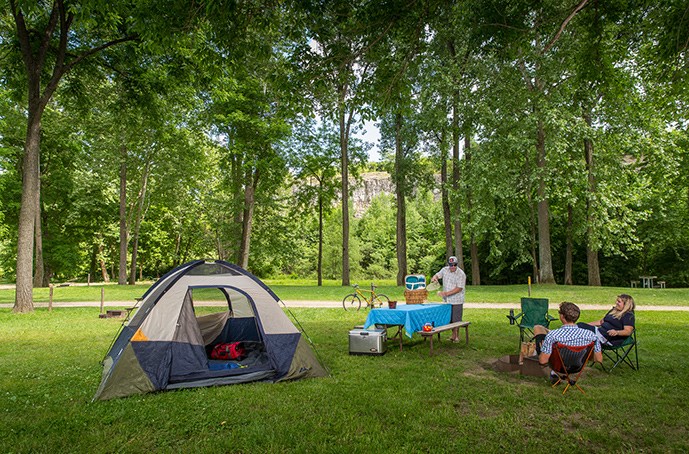Summer is an excellent time to head outside and explore what Mother Nature has to offer. It’s also an excellent time for mosquitos and other bugs to feast on unsuspecting adventurers. So rather than offer yourself up as a tribute to the swarm, prepare yourself for the journey ahead. And since preparation is half the battle, read on to learn how you can enjoy the great outdoors without getting bugged.
Equip Yourself
Wearing proper clothing is one of the easiest and most effective ways to protect your skin outdoors. Think of the proper clothes as a shield against your insect adversaries. Long-sleeved shirts are best at defending against the biting hordes. The same is true of long pants, socks, neck buffs, and any other garment that covers up your skin. In general, the more skin you leave exposed, the more opportunities bugs will have to bite you.
There are some great outdoor gear brands that make just the clothes you’re looking for. North Face, Patagonia, and REI are known for making breathable, durable gear. But pieces from these brands also tend to run at a higher price point. You can seek out discount Carhartt for an affordable alternative that provides just as much protection. Long-sleeved, breathable clothes are an essential line of defense for any outdoor adventurer.
Repel the Invaders
No matter how much skin you cover up, there will still be chinks in your armor. Covering yourself from head to toe will provide insects with few opportunities to bite you, but you’ll also turn your summer hike into a sweaty slog. Besides clothes, then, you’ll want to use other means to fortify your defenses.
With an effective insect repellent, you can create a force field between you and your buggy foes. Insect repellants usually come in the form of a spray that you can apply to your skin and clothing. They contain active ingredients that discourage insects’ pesky bites .
The effectiveness and duration of particular repellents depend on which active ingredients are used and in what concentration. DEET is one of the most common active ingredients, though you can also use more natural repellants like lemon eucalyptus oil. Even if you don’t plan to use insect repellent, bring it with you just in case.
Defend Your Fort
You want to keep your defenses up at all times, especially when you’re vulnerable. And there are few times you’re more vulnerable than when you’re asleep. So if you’re camping overnight in summer, make sure to bring extra protection. You don’t want stealthy insects attacking in the dead of night.
Bugs have an impeccable skill for finding every nook and cranny in your defenses. Even if you’re sleeping in a tent, there’s a chance you may wake up to a distinct high-pitched buzzing in your ear at 4 a.m. Rather than be a midnight snack, reinforce your domain with a mosquito net.
Netting is a commonly used protective barrier against pests. It’s made of small interconnected fibers woven together to prevent insects from breaching your space. In particular, mosquito nets are large enclosures that you can hang over beds or tents. They can even be used for hammocks if that’s your preference. If camping is on your summer agenda, do yourself a favor and reinforce your defenses with a mosquito net.
Choose Your Battles Wisely
In addition to bringing the right gear like clothes, spray, and nets, you want to arm yourself with information. Because, in addition to what you bring, where you go can significantly affect your experience. It may feel like the most irritating insects are everywhere, but they’re really not. By doing some research ahead of time, you can avoid the brunt of their forces.
For example, many of the most annoying insects breed in pools of stagnant water. That means if you’re planning a multi-day river rapids trip, you probably won’t encounter too much insect aggression. But if you’re camping in a place with lots of ponds or a big lake, it’s a completely different story.
If you want to avoid most of the bugs altogether, head to the hills instead. Now, mountain camping has its own share of pesky critters to contend with. But there are generally fewer mosquitoes and other similar species buzzing about. The same can be said for the desert. When it comes to camping, or even just hiking, remember: location, location, location.
Timing
Avoiding still bodies of water is a pretty safe bet when it comes to dodging insects. However, there are certain times of day and of the year that are worse for bugs than others. Learning when those times are is another weapon in your arsenal.
In general, pesky bugs are most active during dusk, dawn, and at night. That’s because bugs — like humans — tend to retreat to the shade during the harsh midday heat. And once the sun begins to set, they emerge. If you’ve ever spent an evening beside a lake, you’re probably quite familiar with this phenomenon.
As for times of year, summer is generally when most insect armies are at their strongest. But depending on where you travel, look out for swarms of particular insects from spring to early summer, blackflies in particular. While the males are just a nuisance, females seek bloodmeals to nourish their developing eggs. So if you’d rather not make a blood donation, avoid blackfly habitats during peak breeding season.
Preparation Is Half the Battle
Braving the wilds can be an exciting, thrilling experience full of beauty and wonder to behold. But the great outdoors aren’t necessarily the safest or most convenient place to spend your time. Small, aggressive attackers will go out of their way to make a meal out of you. Next time you venture out, be sure you prepare yourself with the proper equipment and planning. It will make a world of difference and allow you to enjoy your adventure to the fullest.

